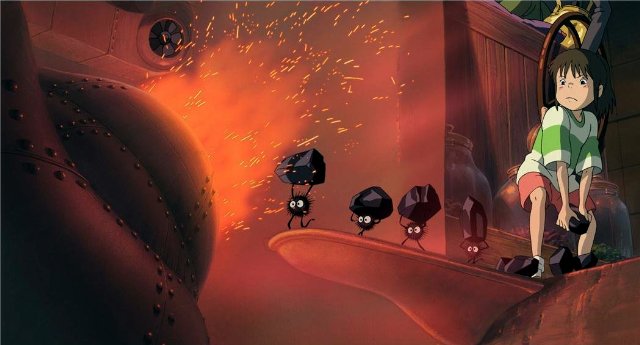
Stunning visuals or heart-stopping action sequences will only buy you so much. If the other crucial elements are missing, your film will surely suffer as a result. The films which disregard this advice tend to be big, shouty action films. The producers hope that by launching as much as they can directly into your face, that you won’t notice the lack of an actual film going on around it. Michael Bay and his Transformers films are the extension of this technique to its logical and grotesque conclusion. Fortunately not everything is quite so drastically terrible; flashy visuals and CGI more often mask a simplistic plot or set of characters without consuming the film entirely. Animated films sometimes suffer a similar but altogether more subtle problem. The artwork is a labor of love and every frame is gorgeous to behold, but the story and the characters only feel like they exist to justify all the pretty pictures. With animated films, the overstated visuals aren’t usually a symptom of a drive towards but perhaps a sign of an imbalance in the creative input for the film. Whatever the cause, I find the final effect of putting everything into ornate visuals is always the same: the film begins to grate partway through and leaves a shallow or incomplete feeling at its conclusion. This feeling always dawns on you in a slow and creeping fashion, pushed back by a tide of self-doubt that you may be the only person who isn’t enraptured by what’s happening on the screen.
I will gain no friends when I say that in my opinion the recently released and much beloved Song of the Sea, directed by Tomm Moore, is one such film which relies too much on visual wonders at the expense of its storyline. This is not to say that Song of the Sea is in any way a bad film. It contains some of the finest and most visually rich animations that I can recall seeing. Every inch of every frame has been delicately crafted. The subtle movements of the characters and the way the animation moves between the surreal and beautifully depicted spaces in the film mark it out as a rare and interesting work. The story takes an original angle by drawing on tales from Irish folklore about Selkies (Seals who can take on human form) which have seldom appeared on the big screen. The film also takes a sensitive and well-judged look at loneliness, jealousy and death - difficult themes to handle well, especially when children are in the target audience. Everything is in place for Song of the Sea to become an enduring classic. So what went wrong?
An increasingly uncomfortable feeling began to steal over me as I watched. I realised that all these wonderful and heart-stealing images didn’t combine into something emotionally affecting as I would have expected. In one early scene, the father struggles to conceal his emotion at the loss of his wife and the film moves into a flashback sequence. The thought flashed into my mind that the father’s grief was just a convenient hook to pull the audience along as another another raft of glittering eye-candy was delivered. This conclusion felt too drastically cynical so early on in the film, but I was unable to shake it entirely. Throughout Song of the Sea, the characters’ difficult and complex emotions are channeled into the realms of fantasy and surrealism. This approach is entirely valid but it begins to grate if the resulting sequences don’t say much about the characters who spawned them. Most of the sequences were reminiscent of Alice in Wonderland: a couple of bizarre, cute or scary new creatures make an entrance only to move the main characters on their way and disappear again.

The film is at least partly aimed at children, but this has never stopped anyone from creating deep and believable characters in the past; quite the opposite is true. The Studio Ghibli classic Sprited Away is perhaps the most obvious comparison to make with Song of the Sea. Both feature young characters unwillingly dragged into a world which is alien and frightening to them. Where Spirited Away excels however is that it conveys a genuine feeling of change and personal discovery in its protagonist Chihiro. In the gorgeously animated and nightmarish dreamscape, Chihiro discovers something about herself through her experiences. Admittedly, Song of the Sea does have its own story arc: A family is drawn together and a widower finally comes to terms with his loss. At the conclusion I just didn’t quite feel attached enough to the characters to make the moment a magical one. I’d consumed a visual feast and been on a protracted adventure, but to me it felt like the characters had only found some new things out instead of changing significantly, almost like the ending of one of Enid Blyton’s old Famous Five novels.
Song of the Sea reminded me most of a particular type of Anime movie, itself somewhat hard to pin down because it spans the genres of drama, fantasy and sometimes comedy. These films are usually found on blu-ray or floating around the internet in HD quality only. They always feature amazing artwork, grandiose visions and trade largely upon transposing emotions (usually negative ones) into extended visual sequences in an attempt to make something that feels deep. Two examples are The Place Promised in Our Early Days or The Girl Who Leapt Through Time. Both these films are critically acclaimed, animated with skill and artifice and touching in their own way. However, both these films (particularly their conclusions) gave me that same uncomfortable feeling that I was being charmed into caring about the characters by the amazing visual effects rather than their own depth and appeal.

I still firmly believe that this film is a great debut and has much to offer its viewers, but I don’t think it is a classic or that it deserves all of the praise it has received. I seem to be in a tiny minority when I express this opinion, and I can’t help but wonder as I write this whether I’ve gotten it all wrong and some of the magic from Song of the Sea simply went over my head. I’d like this to be true and maybe I’ll be eating the words of this review later on, but from my perspective this film doesn’t quite reach its full potential. Song of the Sea has gained wide critical acclaim for Tomm Moore, but I think his best work is still yet to come.




